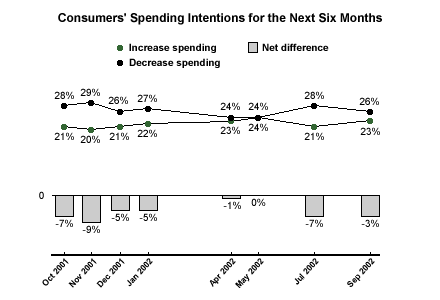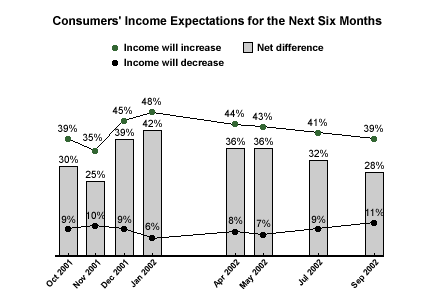As expected, the latest retail sales numbers -- bolstered by auto and home sales -- were relatively strong. Now some on Wall Street are talking about a new disconnect: consumers are saying they are less confident about the economy but at the same time they are spending more. As discussed last week, there is a new consumer psychology at work in today's economy as far as large discretionary expenditures are concerned (see "Is the Economy Better Off Now Than a Year Ago?" in Related Items). Further, consumer spending doesn't move in lockstep with consumer perceptions. Instead, the relationship takes hold over time.
Consumers' Spending Intentions Remain Weak
Even more importantly, consumer, employee, and investor optimism have hovered at very low levels during recent months -- lower than in April and May -- but it does seem to have stabilized. New Gallup Poll economic data (Sept. 5-8)* also show that consumers' spending intentions remain very weak. While 23% of consumers say they plan to increase their spending over the next six months, 26% say they plan to decrease their spending -- a net -3 for consumer spending intentions in September.
Although these numbers are not good news for the nation's retailers -- and they square with the weak back-to-school sales reported by retailers --the situation is actually better than in July when net consumer spending intentions were at -7. Spending intentions are also better than they were last October (-7) and November (-9). On the other hand, the current number is not even as good as the relatively neutral consumer spending intentions of April (-1) and May (0).

Consumer Income Expectations Are Getting Weaker
In the September poll, 39% of consumers told Gallup that they expect their income to increase over the next six months; while 11% said they expect their incomes to decline -- a net +28 for consumer income expectations. Obviously, the fact that more people expect their incomes to increase than decrease is a positive sign for the economy, but this net number has been steadily declining since January, when it stood at +42. Net consumer income expectations are now below where they were last October (+30) and just above their November low point of +25.

Key Points
In my view, this new "disconnect" argument is another economic red herring. The fact is that consumers can continue to spend even as the economy weakens. Reducing savings and increasing debt are always options available to the consumer. As a result, the argument that consumer spending must simultaneously move up and down with consumer perceptions is based on a false premise. Consumer perceptions clearly impact consumer spending over time. Therefore, the steady decline in consumer income expectations is troubling as we look to early 2003.
During the next several months, what to do about Saddam Hussein will be the dominant issue for the nation's policy-makers. And even the Fed now seems to have adopted a laissez-faire attitude -- in his appearance before Congress last week, Fed Chairman Alan Greenspan focused on long-term federal budget issues, not current economic issues. It looks like nothing is going to be done in terms of fiscal or monetary policy to boost the economy in the months ahead.
This hands-off approach is a very risky economic policy. Right now, the consumer and investor psyches are very fragile, as are those of most business executives. Economic stagnation for the remainder of this year could lead to an even weaker economy in early 2003.
*Results are based on telephone interviews with 1,004 national adults, aged 18 and older, conducted Sept. 5-8, 2002. For results based on the total sample of national adults, one can say with 95% confidence that the maximum margin of sampling error is ±3%. In addition to sampling error, question wording and practical difficulties in conducting surveys can introduce error or bias into the findings of public opinion polls.
